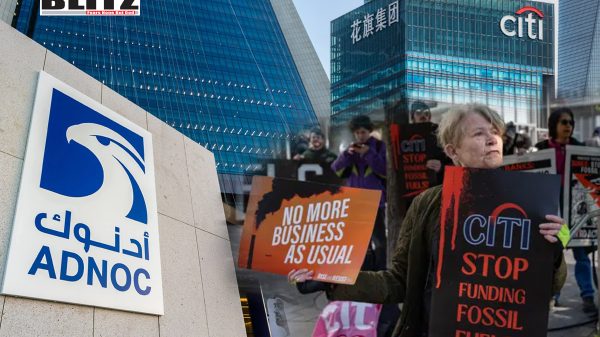Citigroup finances billions to UAE Oil Company despite climate goals
- Update Time : Wednesday, October 23, 2024

Citigroup has been implicated in facilitating a staggering $3.5 billion flow of funds to the Abu Dhabi National Oil Company (Adnoc), one of the world’s largest oil producers and significant contributors to global greenhouse gas emissions. This financial maneuver raises significant concerns about the integrity of climate commitments made by major financial institutions, particularly in light of the urgent need to combat climate change.
Citigroup’s involvement in this transaction was ostensibly indirect. The bank helped raise capital for two chemicals companies, Borouge and Fertiglobe, which are partially owned by Adnoc. This financial structuring allowed Citi to funnel substantial payouts to Adnoc without explicitly accounting for the emissions tied to lending directly to the oil giant.
A banker familiar with the transactions explained that arranging financing for chemicals companies is notably easier than securing loans for oil companies. The banker stated, “If you try and get a loan approved to an oil major, you get asked all sorts of questions: ‘Blah, blah, the ESG [environmental, social, and governance] ranking of the borrower.’ Basically, it’s a huge pain to get organized.” This indicates a systemic loophole that banks can exploit to bypass stringent environmental scrutiny while still enabling fossil fuel companies to thrive.
The mechanism involved a series of loans that collectively raised $4 billion for Borouge in December 2021. Following the loan, Adnoc profited significantly, earning $1.2 billion from the sale of its shares in Borouge and an additional $408 million from special dividends. In total, Adnoc was projected to receive approximately $2.8 billion in payouts from Borouge as a result of the deals. This financial gain underscores the intricate web of transactions that can obscure the environmental impacts of bank financing.
The financial sector is facing increasing scrutiny as banks, including Citigroup, grapple with the dual pressures of profit and sustainability. In March 2021, upon taking office as chief executive of Citigroup, Jane Fraser articulated the bank’s commitment to achieving net-zero emissions by 2050. She stated, “As the world’s most global bank, we can help drive the transition to a net-zero economy and make good on the promise of the Paris Agreement.” However, the recent revelations suggest a significant disconnect between these ambitious climate pledges and actual banking practices.
The pressure on banks to reduce their financing of fossil fuel companies is mounting, driven by customer expectations and activist campaigns. A recent report from the Tax Justice Network highlighted the extensive networks of subsidiaries that coal, oil, and gas companies use, often in secrecy jurisdictions, complicating the transparency of banks’ financing activities. This lack of clarity makes it difficult for stakeholders to assess whether banks adhere to their green policies and accurately report on sustainability efforts.
The financial arrangements surrounding Borouge and Fertiglobe exemplify the lucrative opportunities available to banks, even as they navigate the complicated landscape of environmental accountability. Citigroup earned significant fees for its role in these transactions, sharing approximately $30 million with other banks involved in the Borouge share sale and around $14 million for the Fertiglobe deal. These financial rewards illustrate the profitability of facilitating fossil fuel-related transactions, which can create inherent conflicts with the stated climate objectives of the institutions involved.
Former Triodos Bank director James Vaccaro remarked on the need for stricter regulations to prevent such financial practices, stating, “Without adequate protections through regulations or assured reporting specifically preventing this, then it’s not a surprise.” His comments emphasize the urgency of instituting robust regulatory frameworks to hold banks accountable for their financial activities and ensure alignment with global climate targets.
The revelation of Citigroup’s involvement in financing fossil fuel companies has elicited criticism from environmental activists. Lucie Pinson, executive director of Reclaim Finance, articulated concerns about the dissonance between public climate commitments made by banks and their continued financial support for major emitters. She questioned, “You have to wonder how many other banks are doing similar things,” highlighting a systemic issue within the banking sector.
In the past year, Citigroup has faced mounting pressure from activists, including protests that led to arrests at its headquarters in New York. This activism underscores a growing awareness of the environmental impact of financial institutions and their complicity in perpetuating fossil fuel dependency. As the climate crisis accelerates, stakeholders are increasingly holding banks accountable for their roles in financing industries that contribute to global warming.
As global leaders gather to discuss climate action, the implications of Citigroup’s financial dealings will undoubtedly come under scrutiny. Scientists have reached a consensus that no new oil and gas projects should be approved if the world is to keep global temperatures from rising above 1.5°C, in line with the goals of the Paris Agreement. Adnoc’s plans to increase oil production by 25 percent by 2030 starkly contradict this imperative, placing additional pressure on financial institutions to reconsider their support for fossil fuel endeavors.
The recent findings about Citigroup’s facilitation of financing for Adnoc through indirect means raise crucial questions about the accountability of major banks in the fight against climate change. As the pressure to transition towards sustainable financing intensifies, the financial industry must confront the reality of its practices and align its activities with its stated climate goals. Without meaningful regulatory reforms and a commitment to transparency, the risk remains that financial institutions will continue to prioritize short-term profits over long-term sustainability, undermining efforts to combat climate change effectively. The road to a net-zero economy is fraught with challenges, but it is essential for financial institutions to play a constructive role in navigating this critical transition.














Leave a Reply